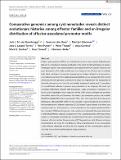Files in this item
Comparative genomics among cyst nematodes reveals distinct evolutionary histories among effector families and an irregular distribution of effector-associated promoter motifs
Item metadata
| dc.contributor.author | van Steenbrugge, Joris J. M. | |
| dc.contributor.author | van den Elsen, Sven | |
| dc.contributor.author | Holterman, Martijn | |
| dc.contributor.author | Lozano-Torres, Jose L. | |
| dc.contributor.author | Putker, Vera | |
| dc.contributor.author | Thorpe, Peter | |
| dc.contributor.author | Goverse, Aska | |
| dc.contributor.author | Sterken, Mark G. | |
| dc.contributor.author | Smant, Geert | |
| dc.contributor.author | Helder, Johannes | |
| dc.date.accessioned | 2022-06-01T16:30:20Z | |
| dc.date.available | 2022-06-01T16:30:20Z | |
| dc.date.issued | 2022-06-01 | |
| dc.identifier | 279613584 | |
| dc.identifier | 301ea22d-809d-4f6b-b9bc-dcd1620d1296 | |
| dc.identifier | 85131176039 | |
| dc.identifier | 000803868500001 | |
| dc.identifier.citation | van Steenbrugge , J J M , van den Elsen , S , Holterman , M , Lozano-Torres , J L , Putker , V , Thorpe , P , Goverse , A , Sterken , M G , Smant , G & Helder , J 2022 , ' Comparative genomics among cyst nematodes reveals distinct evolutionary histories among effector families and an irregular distribution of effector-associated promoter motifs ' , Molecular Ecology , vol. Early View , 16505 . https://doi.org/10.1111/mec.16505 | en |
| dc.identifier.issn | 0962-1083 | |
| dc.identifier.other | RIS: urn:D3539A323909BCA799BE3A5A2E34E287 | |
| dc.identifier.uri | https://hdl.handle.net/10023/25481 | |
| dc.description | JvS, MH and SvdE were supported by a grant from the Applied and Technical Science domain (TTW) of the Netherlands Organization for Scientific Research (NWO) under grant no. 14708. PT received support from the University of St Andrews Bioinformatics Unit (AMD3BIOINF), funded by Wellcome Trust ISSF award 105621/Z/14/Z. MS benefitted from funding by a VENI grant (17282) from the NWO domain Applied and Engineering Sciences. | en |
| dc.description.abstract | Potato cyst nematodes (PCNs), an umbrella term used for two species, Globodera pallida and G. rostochiensis, belong worldwide to the most harmful pathogens of potato. Pathotype-specific host plant resistances are an essential handle for PCN control. However, the poor delineation of G. pallida pathotypes hampers the efficient use of available host plant resistances. Long-read sequencing technology allowed us to generate a new reference genome of G. pallida population D383 and, as compared to the current reference, the new genome assembly is 42 times less fragmented. For comparison of diversification patterns of six effector families between G. pallida and G. rostochiensis, an additional reference genome was generated for an outgroup, the beet cyst nematode Heterodera schachtii (IRS population). Large evolutionary contrasts in effector family topologies were observed. While VAPs diversified before the split between the three cyst nematode species, the families GLAND5 and GLAND13 only expanded in PCN after their separation from the genus Heterodera. Although DNA motifs in the promoter regions thought to be involved in the orchestration of effector expression ('DOG boxes') were present in all three cyst nematode species, their presence is not a necessity for dorsal gland-produced effectors. Notably, DOG box dosage was only loosely correlated with expression level of individual effector variants. Comparison of the G. pallida genome with those of two other cyst nematodes underlined the fundamental differences in evolutionary history between effector families. Re-sequencing of PCN populations with deviant virulence characteristics will allow for the linking of these characteristics with the composition of the effector repertoire as well as for the mapping of PCN diversification patterns resulting from extreme anthropogenic range expansion. | |
| dc.format.extent | 2662119 | |
| dc.language.iso | eng | |
| dc.relation.ispartof | Molecular Ecology | en |
| dc.subject | Cyst nematodes | en |
| dc.subject | DOG box | en |
| dc.subject | Globodera | en |
| dc.subject | Heterodera | en |
| dc.subject | Nematode effectors | en |
| dc.subject | QH426 Genetics | en |
| dc.subject | QR Microbiology | en |
| dc.subject | DAS | en |
| dc.subject.lcc | QH426 | en |
| dc.subject.lcc | QR | en |
| dc.title | Comparative genomics among cyst nematodes reveals distinct evolutionary histories among effector families and an irregular distribution of effector-associated promoter motifs | en |
| dc.type | Journal article | en |
| dc.contributor.sponsor | The Wellcome Trust | en |
| dc.contributor.institution | University of St Andrews. School of Medicine | en |
| dc.contributor.institution | University of St Andrews. Institute of Behavioural and Neural Sciences | en |
| dc.contributor.institution | University of St Andrews. St Andrews Bioinformatics Unit | en |
| dc.identifier.doi | https://doi.org/10.1111/mec.16505 | |
| dc.description.status | Peer reviewed | en |
| dc.identifier.grantnumber | 105621/Z/14/Z | en |
This item appears in the following Collection(s)
Items in the St Andrews Research Repository are protected by copyright, with all rights reserved, unless otherwise indicated.

